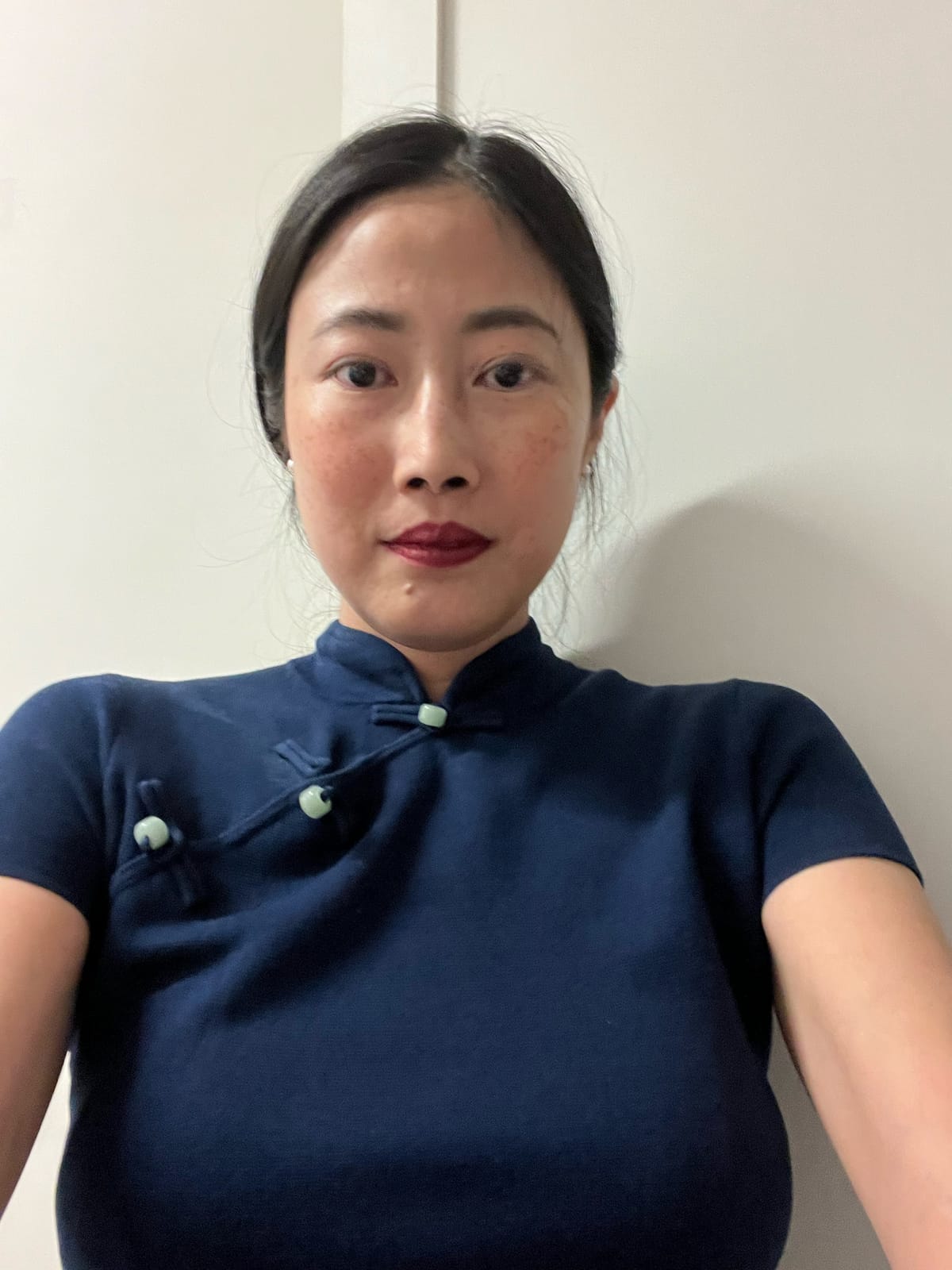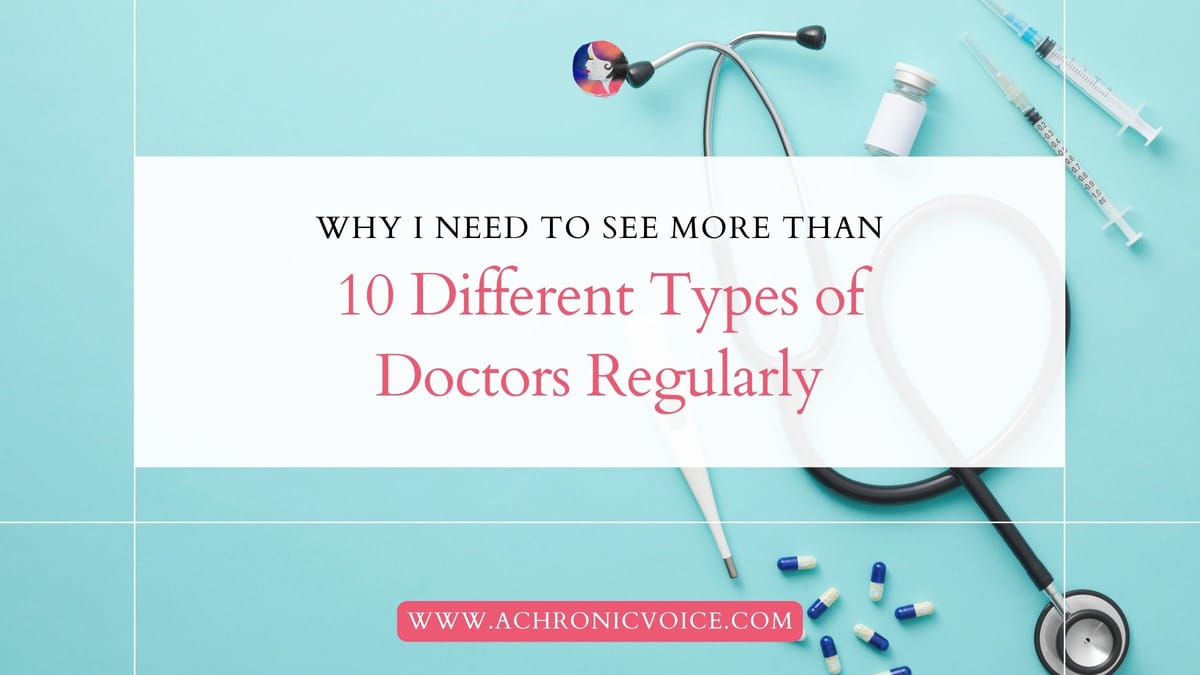The Many Questions with a New Chronic Illness Diagnosis
How do you differentiate between a ‘good’ and ‘bad’ doctor? How do you know if the diagnosis presented is accurate, or if the treatment options presented are the best ones? How do you know if your doctor or surgeon suits your needs?
I'm sure questions such as these have gone through your mind, especially when you're first diagnosed with a chronic illness. It took me 10 years of trial and error to present you this list. Some of these lessons have left permanent scars, both literally and figuratively. It is my hope that you find something useful from this post, and avoid the pain I had to go through.
*Disclaimer: This article is meant for educational purposes, and is based on my personal experiences as a patient. I am not a doctor, and nothing in this article should be substituted for medical advice. Please consult your own doctor before changing or adding any new treatment protocols. This post may also contain affiliate links. It will cost you nothing to click on them. I will get a small referral fee from purchases you make, which helps with the maintenance of this blog. Read our Privacy Policy page for more information. Thank you!
Pin to Your Doctors, Healthcare & Chronic Illness Boards:

1. The Right Doctor is Like a Good Friend (or Parent Figure)
They listen. You should be comfortable communicating with them. They should never brush off or laugh at any of your concerns, especially if it is affecting your quality of life.
They need to take your pain seriously, be it physical or psychological, and treat you with respect. They should never belittle you, or make you feel as if it’s all in your mind and that you are just being 'silly'.
2. Unsure if Your Doctor is Right for You? Seek a Second Opinion
This is the most important lesson I have learned, in relation to selecting a suitable doctor. It is surprising how different their opinions can be, and every doctor has new insight to offer.
Often, there are more treatment options than just one. I once had a gynaecologist tell me that I had no choice but to remove my entire cervix. The extremity of this suggestion was appalling to another specialist I consulted.
So if you do not trust the opinion of your doctor, want to seek alternatives, or want extra confirmation - get another opinion. It is worth every penny you've got.
3. Trust Your Instinct
This might be obvious to some, but take a bit more work for others. If you are like me, I tend to become paralysed until I have assessed all the pros and cons, and obsessed over all the fine details. I am learning how to listen to and trust that little voice inside of me again. More often than not, it already knows what's best for me.
If that little voice is telling you that your doctor doesn't care or isn't interested, it's probably right, and you want to stay away from them like the plague. Why does this matter?
Because your doctor should be treating you as an individual, and not a job number to be struck off a list. If they aren't doing that, it's highly likely that your case isn't getting the attention it should be getting. Some doctors or surgeons may be negligent as well, and you don't want to be that patient who got unlucky. Regrets are for life.
4. Communication and Collaboration are Key in Doctor-Patient Relationships
And also doctor-to-doctor relationships. Chronic illnesses are never an isolated problem. Patients often have to keep up with an assortment of doctors from different departments, covering them from head to toe. When you visit a specialist, they tend to look for and treat only specific issues related to their scope of knowledge. Yet your body functions as a single entity, and one thing always leads to another.
I have found that the best doctors I have and still have, are those who are willing to communicate or collaborate with their patients, and also with each other. For example, my rheumatologist takes the time and initiative to communicate with my heart rhythm specialist. Together, they discuss the best course of treatment to take in relation to both health problems.
An Impressive Healthcare Experience I Had at Cleveland Clinic
One of the best healthcare experiences I have ever had was at the Cleveland Clinic. It was impressive how aware everyone was - from the counter staff to the doctors and surgeons - on why you were there and what for. Their specialists get together to discuss the best solution to a patient’s problem.
With a dozen brilliant minds put together, this can only be beneficial. I remember thinking to myself, "so this is how good management is like." You can learn more about their system in this book, “Communication the Cleveland Clinic Way: How to Drive a Relationship-Centered Strategy for Exceptional Patient Experience”. Keyword - collaboration.
5. A Good Doctor is More Like a Mentor Than a Boss
Finally, at the end of the day, it’s your life and you can choose to live it however you wish. As with everything else, all you have to do is deal with the consequences of your choices.
A good doctor should be more like a mentor and less like a boss. They should never tell you how to live your life, but should be there to warn you of potential pitfalls. They will never be in your shoes - you have to walk in them by yourself. However, they can serve as a guide along the medical journey.
"Doctors pour drugs of which they know little, to cure diseases of which they know less, into human beings of which they know nothing." - Voltaire
"You have your way. I have my way. As for the right way, the correct way, and the only way, it does not exist." - Friedrich Nietzsche






Comments Archives:
Comments imported from previous WordPress site.-
Alison Hayes
-
Carrie Kellenberger
-
Katie Clark
-
Stacey
-
Sheryl Chan
-
Ava Meena
-
Sheryl Chan
-
Christine
-
Sheryl Chan
-
Layla
-
Sheryl Chan
-
Caz
-
Sheryl Chan
-
donna gregory
-
Sheryl Chan
Start a new conversation in the Member Comments below!Sheryl,
these are all great points! There’s been a shift in medical understanding over the last thirty years or so(maybe more) where doctors are getting better at recognizing that they shouldn’t be the dictator/boss of a patient’s treatment, but instead should be empowering us and guiding us towards the right path though partnership.
It’s one of my absolute requirements in working with doctors. They need to work WITH me, not demand I do things. It took too long for me to fully embrace that, but it’s so very true.
I haven’t had as much luck finding doctors who specifically work together, but fortunately I haven’t needed a great deal of medication or been too medically complicated. FND is more about double-checking the cause of new symptoms and managing life stresses.
Thanks so much for writing this – it is so important that we find and see the right doctors for us!
I’ve never found a doctor here in Taiwan that is a mentor or a friend. The healthcare system here is great and mostly free if you don’t have strange diseases like me, but the result of a free and universal healthcare system is that doctors are overloaded and see approximately 101 patients a day. So while I trust my doctor, he never really haves enough time to educate or help dig for further answers. Most chronically ill patients in Taiwan have to take the reins and push or give reminders for certain things, which is why I’m so involved in community outreach here to assist patients.
I’ve found I get through 2 years with a doc and usually need to move on, although my current rheumy is alright. He seems genuine and asks the right questions even if he never has a lot of time for me. Can I find better in Taiwan? I doubt it, so I’ll stick with him.
I haven’t yet found a doctor that’s a mentor; I long for one. So far, I’ve guided my journey (at least with Fibro). Now and then, I’d like someone to check in with that would give me honest guidance.
This is so good! Great, wise tips! Spot on!
Thank you Stacey! Only took me more than a decade with some irreversible damage 😉 ;p
These are great tips. I had two particulary bad doctors in Germany but now I have pretty great Drs in the USA. We may be moving soon, though, and it makes me nervous to think about having to start over and find great doctors again.
Hi Ava,
Yes the process can indeed be tiresome and tedious, unfortunately 🙁 I am curious about your experience in Germany as an expat with chronic illnesses! I’ve always wanted to work/live overseas, but it seems like such a huge hurdle as I need to see 10 different doctors on a pretty frequent basis…not sure how that would work out 😉 Hope you find some good new doctors soon! 🙂
Excellent advice that I wish I had taken years ago when I began this process. I’ve recently moved and have to find a specialist here. I’m a little bit nervous, because I’m leaving an excellent oncologist. At least now I know what to look for. It makes all the difference when you find the right doc.
Hi Christine, yes it can really make a world of difference! I learned all these lessons the hard way too, and hope others don’t get stuck in the same way! Leaving a good doctor is always troubling, I actually worry about the day my favourite doctors retire. I hope you manage to find a doctor/doctors who will work with you as a team. Sending good thoughts!
Great post! I never managed to find a good doctor, the system in the UK makes it difficult to find that one perfect doctor. That’s why I ended up taking matters into my own hand and turned to diet and lifestyle, I felt too sad and let-down to carry on searching!
Thanks Layla! I haven’t heard many good things about the health system in the U.K. so far, unfortunately 🙁 I visited Dr. Graham Hughes twice though (the doctor whom discovered my blood clotting disorder, and which it’s named after), but I didn’t learn anything new. Was still an interesting experience. On the bright (meh) side, you’ve become quite the expert on bladder matters! 🙂
I’ve had my fair share of awful doctors, including heaps that fobbed me off for years, so it really is important to get someone who will listen to you, take you seriously and be supportive. Great post! x
Definitely! They are like partners for life! 😀 :/
Thank you for sharing a link to my “fire your doctor” article. I will be sure to share your post on my social media!
I found it a useful read and hope others will too!